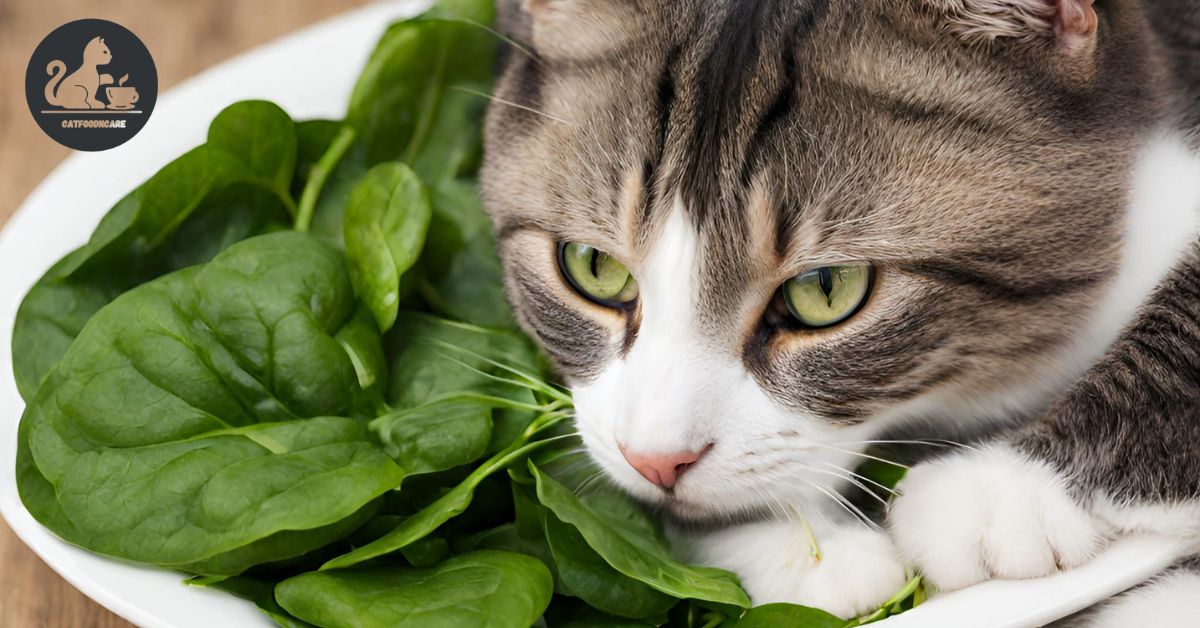Cats are known for their finicky eating habits, but have you ever wondered if they can eat spinach? Spinach, a leafy green vegetable, is packed with beneficial nutrients and is a favorite among many humans. But is it safe for our feline friends? The answer is yes, but only in moderation.
Cats can eat spinach, but it should not replace their regular diet of commercial cat food. Spinach can be a healthy treat for cats, providing them with essential vitamins and nutrients. However, it’s important to note that spinach contains calcium oxalate, which can lead to urinary issues in cats if consumed in large amounts. Therefore, it’s best to serve spinach as an occasional treat and not as a main food source.
Also, keep in mind that while spinach has many health benefits for humans, cats are carnivores by nature and require a diet primarily made up of meat. So, while a little bit of spinach can be a good supplement, it should never replace their need for meat.
In this blog post, we will delve deeper into the topic of cats and spinach, discussing the potential health benefits and risks, and how to safely introduce this leafy green into your cat’s diet.
What Do Veterinarians Say about Feeding Spinach to Cats?
Veterinarians agree that spinach for cats can be a healthy treat if given in moderation. Raw spinach has many health benefits as it is a good source of vitamins like Vitamin A, Vitamin C, and Vitamin K. These vitamins support blood cell function, immune function, and normal blood clotting.

However, vets also warn about potential health issues. Spinach contains calcium oxalate, which can lead to urinary issues like bladder stones and affect kidney function. Cats with existing urinary tract problems should avoid spinach.
Cats are carnivores by nature and their daily calorie intake should come primarily from meat. Commercial cat food is specially designed to meet their nutritional needs. Spinach for cats should only be an occasional treat, not a main part of their diet.
If you decide to feed your cat spinach, it’s best to give them cooked spinach. Raw spinach can cause stomach upset and other digestive issues. Always serve it in bite-sized pieces to prevent choking.
Remember, while spinach has nutritional benefits, it’s not necessary for a cat’s diet. Always consult your vet before introducing new foods to your fur baby’s diet.
Can Cats Eat spinach?
Yes, cats can eat spinach, but it should be given in moderation. Spinach is a leafy green that is packed with beneficial nutrients like Vitamin A, Vitamin C, and Vitamin K. These vitamins support various body functions including blood cell function, immune function, and normal blood clotting.
However, spinach also contains oxalic acid, which can lead to calcium oxalate bladder stones in cats. These stones can cause urinary issues and other health problems. Therefore, it’s important to limit the amount of spinach you give to your cat.
Cooked spinach is a better option than raw spinach because cooking reduces the oxalic acid content. But remember, spinach should not replace your cat’s regular diet of commercial cat food, which is specifically formulated to meet their nutritional needs.
Spinach can be a healthy treat for your cat, but it should only make up a small part of their daily calorie intake. Too much spinach can lead to stomach upset and other digestive issues. Always consult with your vet before introducing new foods into your cat’s diet.
Nutritional Benefits of Spinach for Cats?
Spinach is a leafy green vegetable that can provide several nutritional benefits for cats. Here are some of the key benefits:
- Spinach is a source of vitamins like Vitamin A, Vitamin C, and Vitamin K. These vitamins support various bodily functions such as blood cell function, normal blood clotting, and immune function.
- It also contains folic acid, which aids in blood cell formation and genetic material synthesis.
- Spinach is a good source of fiber. Fiber can help with bowel movements and overall digestive health.
- The water content in spinach can help keep your cat hydrated, especially if they primarily eat dry food.
- Spinach also contains Omega-3 fatty acids, which can support healthy skin and coat.
However, it’s important to note that spinach also contains oxalic acid, which can lead to the formation of calcium oxalate bladder stones if consumed in large amounts. Therefore, spinach should only be given as an occasional treat and not as a main part of their diet. Always consult with a vet before introducing new foods into your cat’s diet.
Also, remember to serve spinach in small, bite-sized pieces to prevent choking and always thoroughly wash it to remove any potential pesticides or bacteria.
Potential Health Risks of Feeding Spinach to Cats?
- Feeding spinach to cats can pose potential health risks. While it is a source of vitamins and fiber, it also contains oxalic acid. This can lead to the formation of calcium oxalate bladder stones in cats, causing urinary issues.
- Raw spinach in large amounts can cause stomach upset in cats. It can lead to digestive issues like vomiting or diarrhea.
- Spinach is not a source of protein, which is essential for cats. They are carnivores by nature and require animal protein for healthy growth and development.
- Overfeeding spinach can lead to nutritional deficiencies in cats. It should not replace commercial cat food, which is specially formulated to meet a cat’s nutritional needs.
- Spinach contains Vitamin A which is beneficial for cats, but in excess, it can lead to Vitamin A toxicity causing muscle weakness and bone issues.
- Cats with existing kidney function problems should avoid spinach. The calcium oxalate in spinach can exacerbate these issues, leading to kidney stones.
- While spinach has health benefits for humans, it may not offer the same benefits for cats. They have a different digestive system and cannot process leafy greens the same way humans can.
How to Feed spinach to Cats Safely?
Feeding your cat spinach can be a healthy treat, but it’s important to do it safely. Here’s a step-by-step guide on how to feed spinach to your cat:
1. Choose Fresh Spinach: Always opt for fresh, clean spinach. Avoid canned or frozen spinach as they often contain added salt or preservatives that can be harmful to cats.
2. Wash the Spinach: Rinse the spinach thoroughly under running water to remove any pesticides or dirt. This is crucial to prevent any potential health issues.
3. Cook the Spinach: Raw spinach can be hard for cats to digest and may cause stomach upset. Cooking the spinach makes it easier for your cat to digest and also reduces the levels of oxalic acid, which can contribute to the formation of calcium oxalate bladder stones.
4. Cut into Bite-Sized Pieces: After cooking, cut the spinach into small, bite-sized pieces. This makes it easier for your cat to eat and reduces the risk of choking.
5. Mix with Cat Food: To make the spinach more appealing to your cat, mix it with their favorite food. This could be commercial cat food, wet food, or even a small amount of canned tuna.
6. Monitor Your Cat: Keep an eye on your cat after they eat the spinach. If they show signs of an upset stomach or allergic reaction, stop feeding them spinach and consult a vet.
Remember, while spinach has many health benefits, it should only be an occasional treat. Cats are carnivores by nature and their main diet should consist of animal protein. Spinach can be a source of vitamins and fiber, but it should not replace a balanced cat food diet.
Also, spinach contains calcium oxalate, which can cause urinary issues in cats, including the formation of bladder stones. Therefore, it’s important to feed spinach in moderate amounts and always ensure your cat has access to plenty of fresh water.
While spinach can be a healthy snack for your cat, it’s important to prepare it properly and feed it in moderation. Always monitor your cat’s reaction to new foods and consult a vet if you notice any health issues.
Conclusion
spinach can be a healthy treat for your cat in moderation. Raw spinach and cooked spinach both have health benefits like being a good source of vitamins A, C, and K. However, too much spinach can lead to health issues like urinary tract problems and stomach upset due to its high oxalic acid content. Always remember, while spinach for cats can be a nice change, their main diet should still be high-quality commercial cat food. So, next time you’re preparing a salad, feel free to toss your fur baby a leaf or two as a special treat. But remember, moderation is key!
Recent Posts
10 Best Canned Cat Foods of 2024, According to Veterinarians
Inside this expert-backed list of 2024's top wet cat foods, discover why veterinarians trust these brands for optimal feline nutrition.
Grab expert insights into the top-rated wet cat foods that veterinarians trust most, and discover why some brands outshine...

